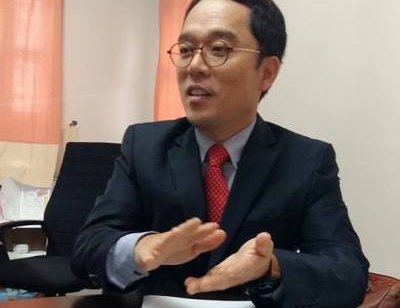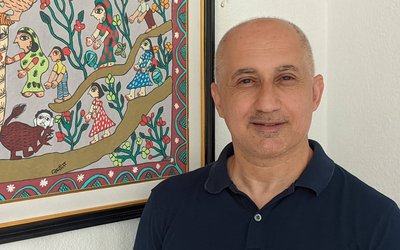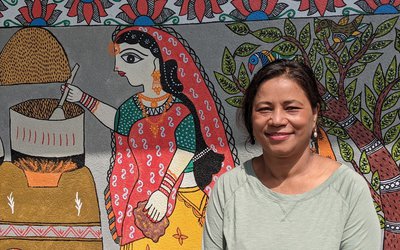
KOICA is one of the major development partners of Nepal, how do you see the role of KOICA in the coming days in Nepal’s development?
The recent earthquake that occurred in Nepal has outlined various needs in reconstruction. So, currently, I value the importance of reconstruction. As there is a new constitution, it has definitely identified new sectors and needs; so aligning with the needs of the constitution, KOICA has also prepared new plans and priorities, etc. So, in order to ameliorate the current situation, KOICA is certain that it will be playing an important role.
Following the earthquake, Nepal gradually entered into the reconstruction and rehabilitation phase. How can KOICA support Nepal now?
Korean Government has made a commitment of USD 10 million at the donor’s conference to the government of Nepal. Furthermore, we have decided to focus especially on the health sector reconstruction. So, we will be focusing on reconstruction at Nuwakot.
KOICA has been supporting Nepal in the development of human resources providing long term and short term training for Nepal’s civil service. What would be the nature of training in coming days?
You are already aware that there is a new constitution in Nepal. So I believe that it has brought new aspirations and, with that, new areas as well as sectors have also been determined. So, KOICA will support in these areas. As we know that this earthquake has brought the need for not only massive but better reconstruction. Therefore, KOICA will support in such avenues and the priority will be given to the need that is felt by the Government of Nepal
Although the levels of Nepal and Korea’s economic development is different, Korea’s rural development approach can be a good model for Nepal. How do you see Nepal and KOICA’s agreement to implement rural development projects in Nawalparasi district in this context?
Korea has definitely had a successful experience in rural development. However, the approach will be customized not only as per the need of the Nepalese people but also according to the Nepalese context. Furthermore, the successful experience will be shared and the lead will be taken by the Government. The project will be driven as per the aspirations of the new Constitution.
KOICA has been supporting Nepal’s rural health sector for a long time, including in Dhangadhi and Mugu. Do you have any plan to extend it further?
The plan completely depends upon how the Nepalese Government utilizes our support. When we complete the project then the actual evaluation of the project begins. So, if the government is able to increase the effectiveness of such support then KOICA will definitely go ahead with such projects. However, we still need to see the ownership by the government for such projects.
How do you see Nepal’s overall development strategy?
I want to mention that the strategy is very good. However, more results-based approach is needed to make the best use of domestic and external resources. I believe Nepal should prioritize the development goals more clearly to allocate effectively the scarce resources and assure real outcomes. Also, I do see a gap in the implementation process. The other problem is the institutional capacity gap between central and local level governmental bodies; as it is goal driven but not process driven.
The government has announced that it wants more support in infrastructure projects like hydro, roads and airports. In the past KOICA has supported to prepare DPR of Kanti Rajapth and study of Chameliya Hydropower project. Do you see any such support in infrastructure?
Well, such support is possible in future not only by KOICA but I guess from other international partners as well. However, political stability is very much essential. Other than that, in my opinion, the most important aspect is vision. I believe a clear vision of the government is also needed.
What kind of policy do you pursue in your tenure in Nepal?
It is actually a very simple policy. I will let the Nepalese side think more about what kind of support is needed. Furthermore, I believe that this has to come from Government side rather than the Korean side. Let me clarify further by using a metaphor for instance, I am a banker so I am asking the government to give me some projects where the return is very high. Here the return is let’s say social benefits. So, I will invest only in such projects where there will be high social benefits, that is to say “positive results for Nepali people” from the outcome-oriented perspectives.
What will be the role of Korean Volunteers in the coming days in Nepal’s development?
Korean overseas volunteers or KOVs have been playing a very significant role for a long period of time in Nepal. Furthermore, they are involved in experience sharing and transferring of skills at the grass root level. This has helped in strengthening the relationship between the two nations. So, in the upcoming days the role will be expanded further and we will be focusing more on the output. The recipient organization’s need will always be the first priority.
- TANAHU HYDROPOWER PROEJCT: A Significant Achievement
- Apr 15, 2024
- AMBASSADOR HANAN GODAR: Sharing Pain With A Nepali Family
- Mar 30, 2024
- VISIT OF KfW AND EIB TO NEPAL : Mission Matters
- Mar 25, 2024
- NEPAL BRITAIN SOCIETY: Pratima Pande's Leadership
- Mar 24, 2024
- NEPAL ARMY DAY: Time To Recall Glory
- Mar 15, 2024
















